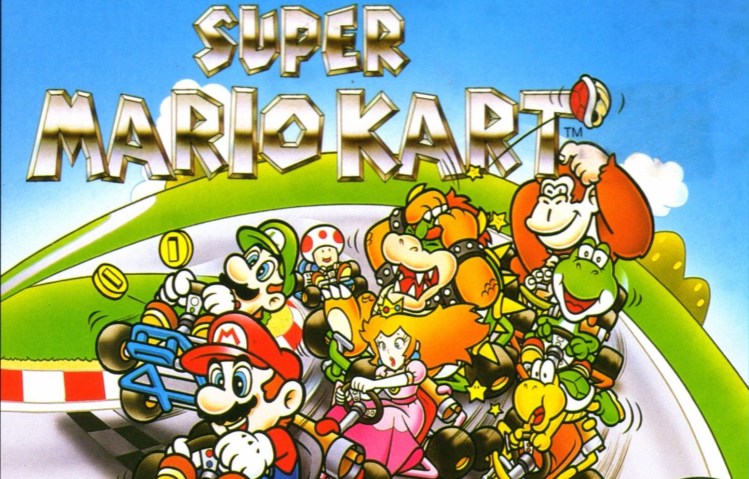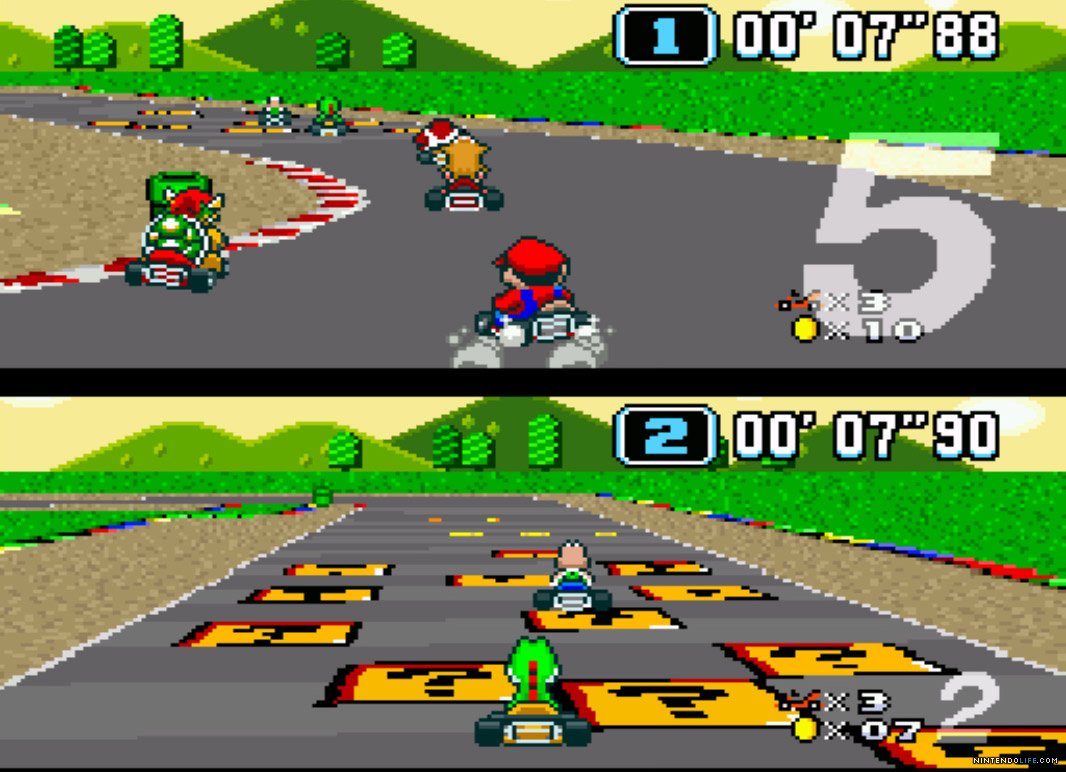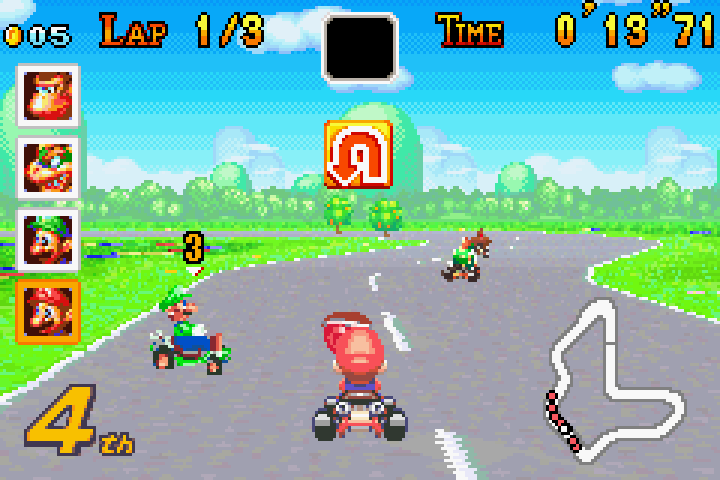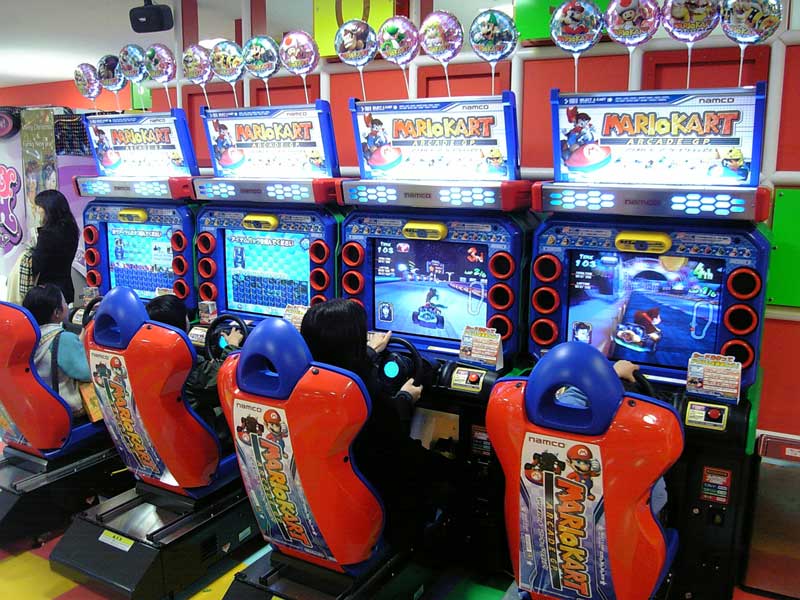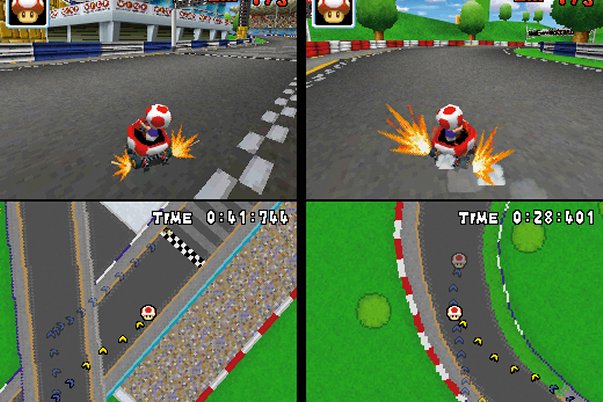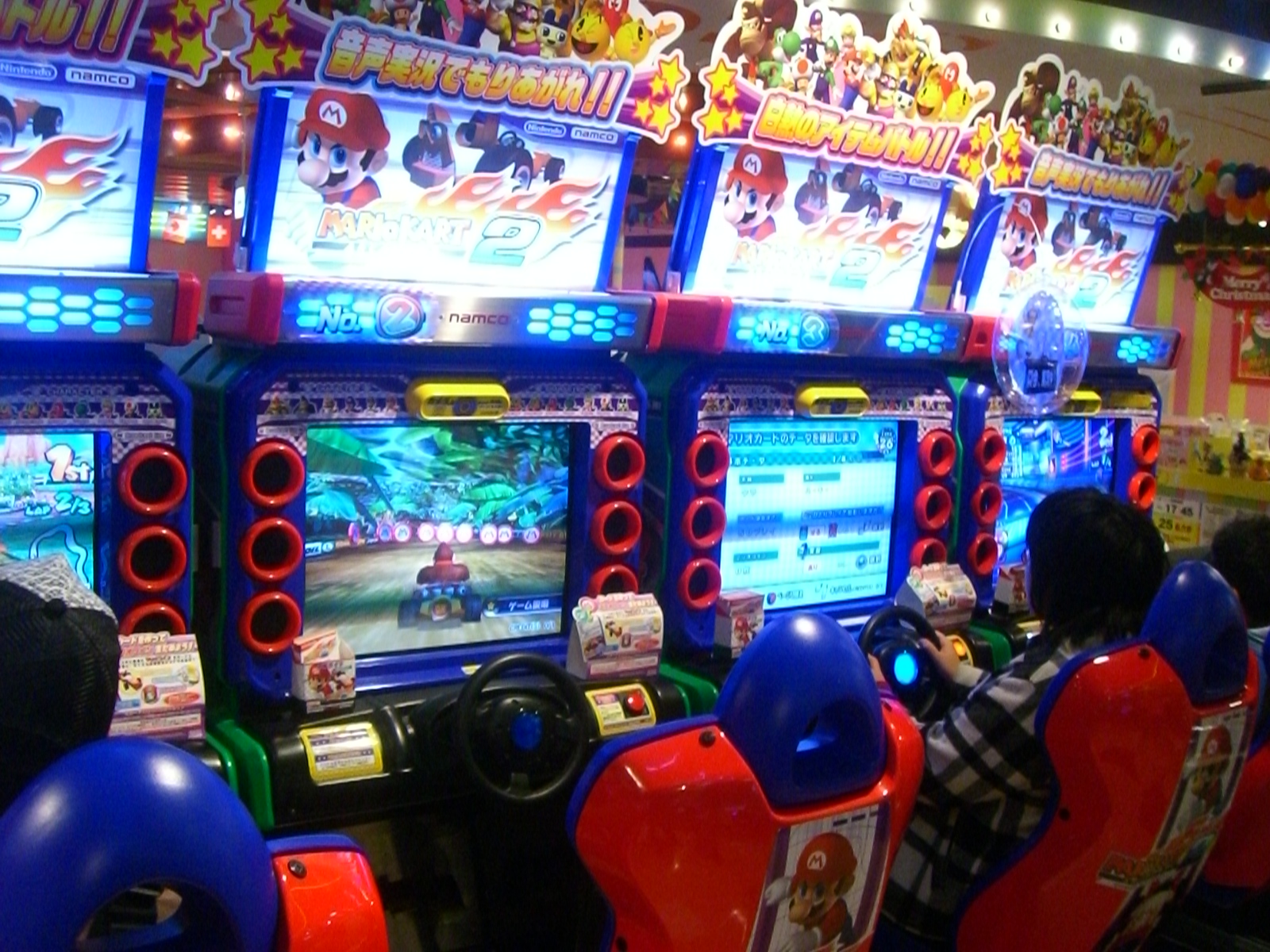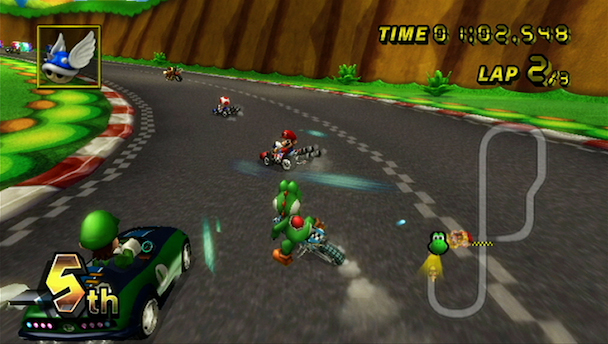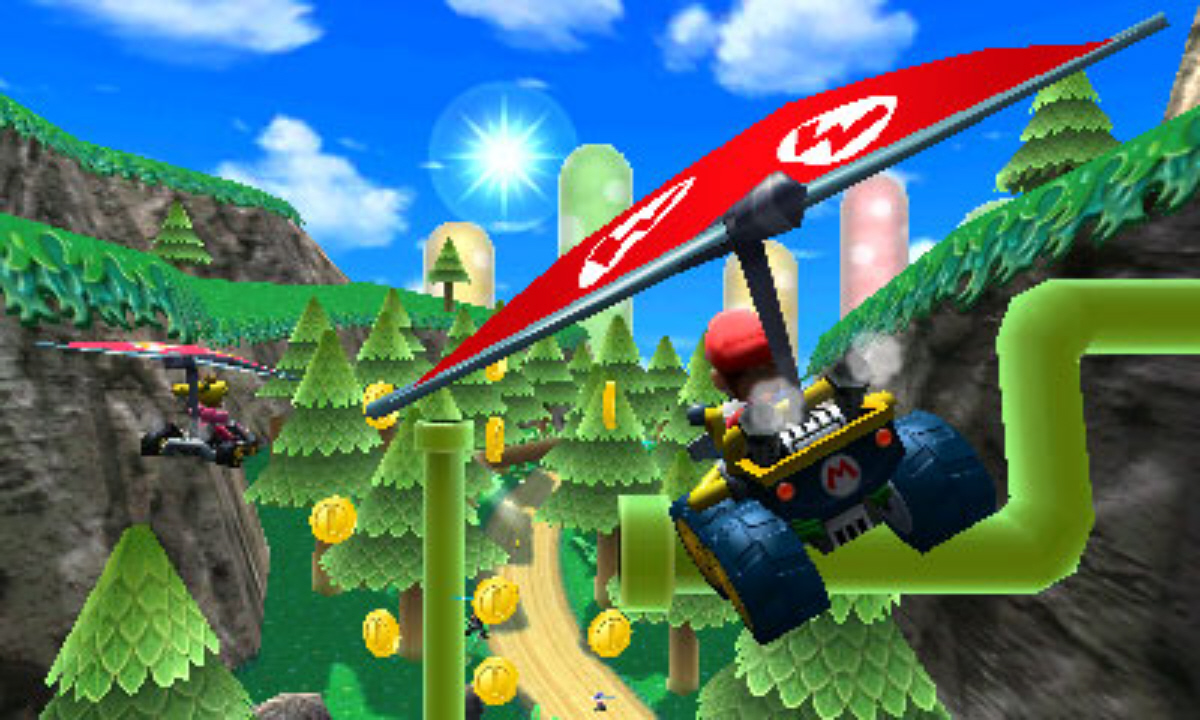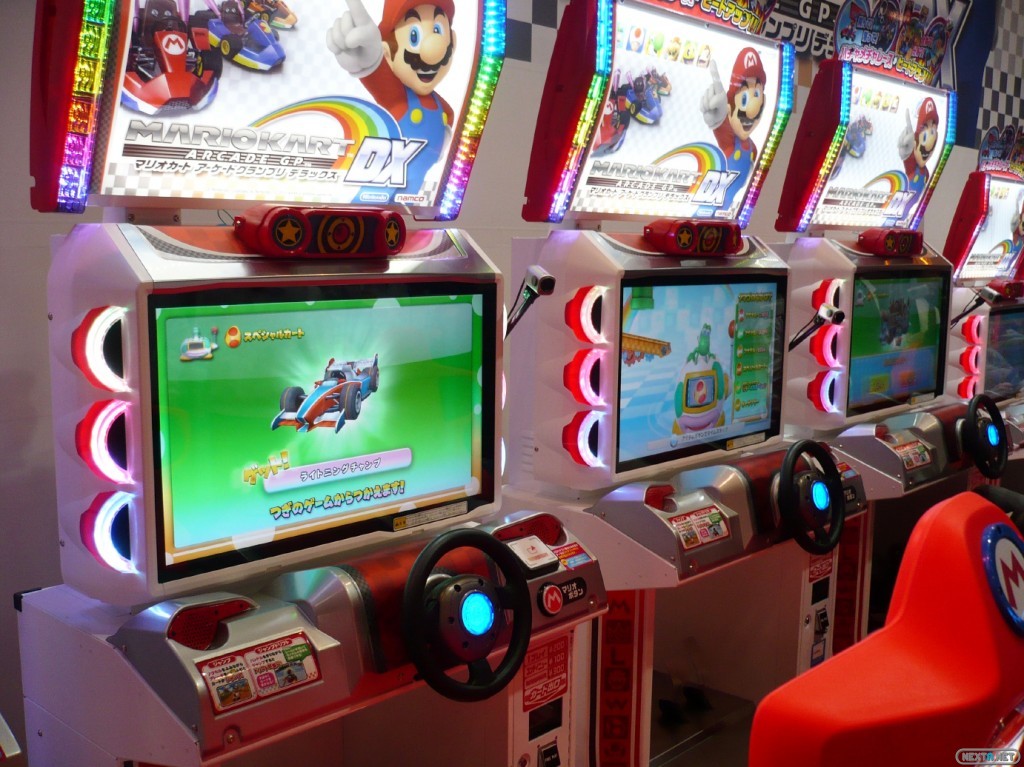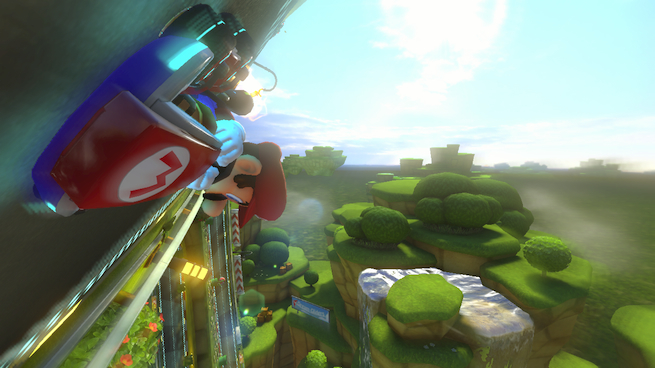When you think about, it really sounds like a stupid idea for a game.
I mean, what was Nintendo thinking? “Let’s just put all of the Mario characters in little karts and have them race and throw banana peels at each other.” Um, OK? Is this a joke?
Well, the joke’s on us. Mario Kart has become one of Nintendo’s biggest franchises, and the gaming giant has made sure to release a new one with every console it makes. With the upcoming Mario Kart 8 coming out on the Wii U on May 30, we thought it would be fun to look back at the series’ history.
Super Mario Kart
System: Super Nintendo Entertainment System
Release date: Sept. 1, 1992
Number of racers: 8
It’s hard to believe that the kart-racing genre wasn’t always around, but it really got its start with Super Mario Kart. The Super Nintendo classic enabled two players to race against each other as different characters in the Mario franchise on colorful courses. You could also fight your friend in Battle Mode, where each player had to eliminate the other by using weapons.
The roster included Mario, Luigi, Yoshi, Princess Peach, Bowser, Toad, Koopa Troopa, and Donkey Kong Jr.
Super Mario Kart was one of the Super Nintendo’s most popular releases, and it helped create a new sub-genre of racing games. Instead of focusing entirely on skill, Mario Kart added items to the mix. The player could use homing shells, banana peels, and invincibility stars to gain an advantage. Even if you were stuck in last place, there was always hope you’d get some good items and make a big comeback. Keeping true to Nintendo’s philosophy, it was fun for everyone, and Super Mario Kart established one of the company’s most enduring series.
Mario Kart 64
System: Nintendo 64
Release date: Feb. 10, 1997
Number of racers: 8
Super Mario Kart’s first sequel was a huge title on the Nintendo 64. Mario Kart 64 enabled up to four players to race and battle simultaneously. While the hardware limitations of the Super Nintendo forced all tracks to remain flat, levels in Mario Kart 64 featured changes in elevation, pits, and other obstacles.
The roster remained largely the same from the previous game although Wario replaced the Koopa Troopa. Donkey Kong Jr. got upgraded to the new version of Donkey Kong that debuted in 1994’s Donkey Kong Country.
Mario Kart: Super Circuit
System: Game Boy Advance
Release date: Aug. 27, 2001
Number of racers: 8
Mario Kart: Super Circuit was the first portable iteration of the series. It’s also the only Mario Kart to launch with a Nintendo system. Graphically, Super Circuit was similar to the original Super Mario Kart. While it featured new tracks, it also included all of the courses from the original. The roster remained the same from Mario Kart 64.
Mario Kart: Double Dash
System: GameCube
Release date: Nov. 17, 2003
Number of racers: 20
Double Dash is the black sheep of the Mario Kart franchise. It featured a big gameplay change that never returned in any of the sequels. Each kart actually supported two characters, and you could switch between them whenever you wanted. While one raced, the other would throw items. Each character also had a special weapon that only he could use. For example, Mario could shoot fireballs, and Toad could use an unlimited amount of mushroom boosts for a limited time. Two players could even play on the same kart.
It was a fun, quirky addition, and LAN support actually enabled 16 players to play simultaneously (if you had the extra GameCubes). Also, Double Dash greatly increased the roster size to 20. New racers included Diddy Kong, Daisy, Birdo, Waluigi, Bowser Jr., Baby Mario, Baby Luigi, Toadette, Petey Piranha, and King Boo. You could also choose between 21 different karts.
Mario Kart Arcade GP
System: Arcade
Release date: October 2005
Number of racers: 11
Mario Kart Arcade GP was the first entry in the series released (and only released) for arcades. Like other arcade racers, players sit and use car-like pedals and a steering wheel. The arcade version also had a lot more items than the console counterparts, which usually only have a dozen or so weapons. Mario Kart Arcade GP had over 100.
Namco Bandai actually developed the game, which explains why Pac-Man, Ms. Pac-Man, and Blinky are part of the racing roster.
Mario Kart DS
System: Nintendo DS
Release date: Nov. 14, 2005
Number of racers: 13
Mario Kart DS took advantage of the portable’s dual displays by showing a large map of the course on the bottom screen. Players could also race online for the first time thanks to the DS’s Wi-Fi abilities. After some of Double Dash’s experiments, Mario Kart DS was more of a return to tradition. Only one character would race on each kart.
The roster also got a little smaller although it featured the racing debuts of Dry Bones and R.O.B. the robot. The Shy Guy was also playable, but only if you were playing single-cart multiplayer.
Mario Kart Arcade GP 2
System: Arcade
Release date: 2008
Number of racers: 13
GP 2 was similar to the first arcade Mario Kart, but developer Namco Bandai added new courses, items, and characters. The only new racer to the series was Mametchi, a character from the Tamagotchi toy craze that swept through America in the late ’90s.
Mario Kart Wii
System: Wii
Release date: April 27, 2008
Number of racers: 25
Mario Kart Wii brought a lot of new features to the series. Obviously, it took advantage of the system’s motion controls by enabling players to hold the Wii remote like a steering wheel. The game even came bundled with a peripheral in the shape of a steering wheel, which the Wii remote comfortably fit into. Still, players could opt for more traditional controls.
Mario Kart Wii also added motorcycles to the mix, and players could perform tricks in midair. It also had a massive roster of 25 characters, including newcomers Baby Peach, Baby Daisy, Rosalina, Funky Kong, and Dry Browser. You could also unlock your Mii avatar as a playable racer.
Mario Kart 7
System: Nintendo 3DS
Release date: Dec. 4, 2011
Number of racers: 17
Of course, Mario Kart 7 took advantage of the 3DS’s ability to display games in glasses-less 3D, but it also added gliders that enabled you to slowly descend to the ground after big jumps. You could also customize your karts by selecting different bodies, gliders, and wheels for your vehicle.
The roster went down to 17 characters, but Nintendo added new faces like Metal Mario, Honey Queen, Wiggler, and Lakitu. You could also play as your Mii avatar.
Mario Kart Arcade GP DX
System: Arcade
Release date: Winter 2013
Number of racers: 13
GP DX was the third arcade Mario Kart developed by Namco Bandai. It featured 13 racers, but some characters had different palette swaps. For instance, you could race as Mario in his fire-flower color scheme.
The only new racer to the series was Don-chan, the mascot for Namco’s Taiko: Drum Master series of rhythm games.
Mario Kart 8
System: Wii U
Release date: May 30, 2014
Number of racers: 30
Coming out soon, Mario Kart 8 brings back the bikes from Mario Kart Wii and adds ATVs to the vehicle list. Courses also include gravity-defying elements, enabling racers to climb up walls and spiral upside down. Players can play on the TV or on the Wii U’s GamePad.
Mario Kart 8 features the largest roster yet. Players can pick between 30 racers, including all seven of the Koopalings. Just like in Mario Kart 7, you can also play as your Mii.
VentureBeat's mission is to be a digital town square for technical decision-makers to gain knowledge about transformative enterprise technology and transact. Learn More
